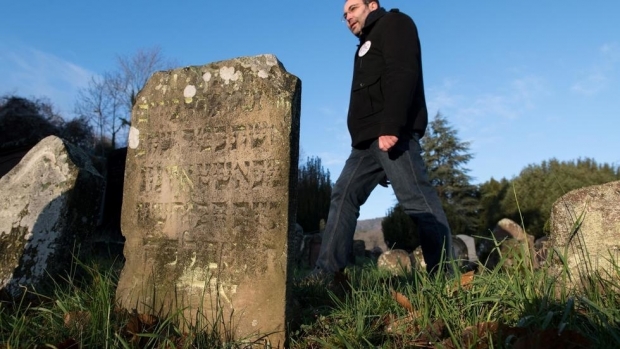 English
English Français
Français
Read in the news
|
Published on 7 January 2020
France - "Guardians of memory" keep watch over France's Jewish cemeteries

Published on January 7 in France 24
Autumn leaves rustle as Lionel Godmet walks past rows of graves at the Jewish cemetery in Jungholtz in eastern France, their bases fringed with moss but the Hebrew inscriptions clearly visible.
Pinned to his lapel is a badge reading "veilleur de la memoire", or guardian of memory.
The cemetery's existence is a tribute to a community battered by centuries of history, and all but destroyed by the Holocaust.
But Lionel Godmet himself is not Jewish. He is one of a growing number of individuals in France's Alsace region who have taken it upon themselves to patrol Jewish cemeteries after a spate of attacks on such sites that have horrified the country.
Lionel Godmet describes his volunteer work as a "civic commitment" and likens it to that of watchmen who stand guard over the region's celebrated hilltop castles.
"It is our heritage and our history," he said.
"Jews are France"
Such work has become all the more urgent after the latest attacks on cemeteries in the Alsace region.
Early this month, 107 graves were defaced with swastikas and other anti-Semitic graffiti at the cemetery in Westhoffen.
President Emmanuel Macron wrote on Twitter afterward that "Jews are and make France" and that "those who attack them, even their graves, are not worthy of the idea we have of France." His government then announced the creation of an anti-hate crime bureau.
That attack came after 96 tombs were desecrated at a cemetery in Quatzenheim, also in Alsace, in February.
The rising number of anti-Jewish offences reported to police -- up 74 percent in 2018 from the previous year -- has caused alarm in the country that is home to both the biggest Jewish and Muslim communities in Europe.
Godmet, a religion teacher, is now one of 20 "guardians of memory", a network set up by the regional council in October, informing the authorities of any problems at the cemeteries or their surroundings.
Alsace has 67 Jewish cemeteries, a high number explained by the presence in the past of many rural Jewish communities spread across the region. Now, most of these communities have ceased to exist, making protecting the cemeteries all the more difficult.
The Jews of Alsace represented more than half of France's Jews in the 18th century but had to wait until 1791 to regain the right to reside in towns, which had been stripped in the 14th century.
"Today, there are fewer than 20,000 Jews in Alsace of a total of two million people. And since the Holocaust there are no longer any Jews in the countryside," said Philippe Ichter, who heads a commission promoting religious dialogue in the region, and who initiated the project to guard the cemeteries.
"Pay more attention"
The guardians judge for themselves how often to patrol in the cemeteries, ensuring a minimal presence and alerting the authorities to any problems.
They are advised not to intervene if they come across vandals in the act.
"You can't put a policeman in every cemetery," said Francis Laucher, who also volunteers as a watchman at the Jungholtz cemetery along with his wife Solange.
"We are both Alsatians to our core. And how can such things come to pass? Leave the dead in peace!" said Laucher, a retired engineer, as he wandered among the tombs.
The vast Jungholtz cemetery was created in 1655. Old tombstones covered in moss and sometimes askew mix with newer ones, some of which show signs of recent visits by relatives.
It was badly vandalised under the Nazis from 1940 to 1944, when some 400 tombstones were smashed. But it has not suffered any damage since.
"We pay more attention than we did before," said Robert Tornare. He and his wife began keeping watch over the cemetery in Wintzenheim, which their house overlooks, some 40 years ago.
"We are Catholics, but after 40 years they have become our friends," he said, saying his wife had Jewish playmates when she was a schoolgirl and that years later they suggested she keep a key to the cemetery.
"Lots of ignorance"
"I hope that the sad things we have seen repeat themselves every six months serve as an electric shock for other citizens," said Laurent Schilli, secretary general of the Haut-Rhin region's Jewish council, which oversees the volunteers.
"You need to convince people who are not convinced that there is a problem," he said.
"Here we have people who do this in their free time, as volunteers, for a community that is not even theirs. That is saying something," Schilli added.
Back in Jungholtz, Lionel Godmet admits it is tough to mobilise young people for such work. However, last February after the Quatzenheim attack, his students took part in an exercise at the local cemetery, observing the Jewish custom of placing stones on graves as a visitor's homage.
"The students don't know so much about Judaism even though many live close to the cemetery," he said. "There's lots of ignorance, but it's the same for Islam."
Source :
France 24
